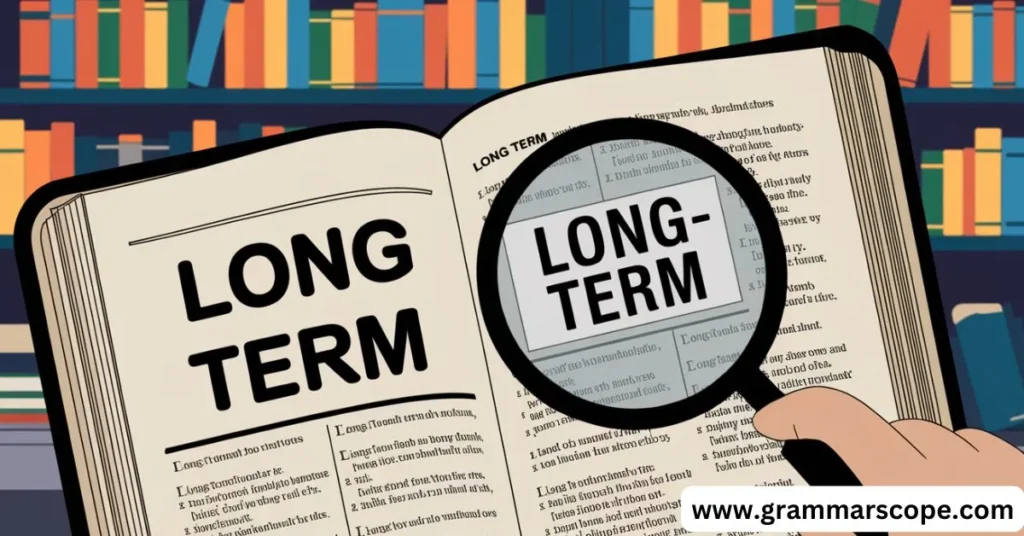When writing, few grammatical nuances trip up even seasoned writers as much as choosing between “long term” and “long-term.” Is “long term” hyphenated? Should you always use “long-term,” or are there situations where the space-separated version is better? Understanding these distinctions is crucial for polished, professional writing. Let’s explore the differences and ensure you always make the right choice.
Why is There Confusion?

The confusion between “long term” and “long-term” arises from their similar appearance and overlapping usage. Both forms are correct, but their function in a sentence determines which one to use. Misusing these terms can lead to clunky, unclear writing, especially in professional or academic contexts. Furthermore, the existence of terms like “longtime” or even the erroneous “longterm” adds to the ambiguity.
To write with precision, you need to know how to distinguish between the noun phrase and the adjective forms of this versatile expression.
What Does “Long Term” (with Space) Mean?
The phrase “long term” without a hyphen functions as a noun phrase. It refers to an extended period or a span of time. Typically, you’ll find this form used after prepositions or as the object of a verb. For example:
- She’s focused on the long term.
- Planning for the long term will yield significant benefits.
In these sentences, “long term” stands alone as the object, emphasizing a prolonged period rather than modifying a noun. Think of it as referring to the distant future in a standalone context.
Scenario Example:
Email Example Subject: Long Term Planning Discussion
Hi Maria,
I wanted to touch base regarding our strategy for the long term. Let’s schedule a meeting to outline the key objectives we aim to achieve over the next decade. Focusing on the long term will help us ensure sustainable growth.
Best regards,
James
What Does “Long-Term” (Hyphenated) Mean?
“Long-term” with a hyphen acts as an adjective. It describes something lasting or extending over a significant period, modifying a noun. For instance:
- We need a long-term strategy to address these challenges.
- His long-term commitment to the project was admirable.
The hyphen is essential here because it signals that “long” and “term” work together to modify the noun that follows. Without the hyphen, the sentence might become ambiguous or grammatically incorrect.
Scenario Example:
Formal Report Title: Long-Term Investment Strategy
Developing a comprehensive long-term investment strategy is critical for ensuring steady financial growth. A long-term approach minimizes risks and aligns with sustainable objectives, benefiting stakeholders over time.
“Long Term” vs “Long-Term”: The Differences
To clarify, here’s a quick comparison:
| Aspect | Long Term (with space) | Long-Term (hyphenated) |
|---|---|---|
| Grammatical Function | Noun phrase | Adjective |
| Usage | Refers to a period of time | Describes something lasting for a long period |
| Example Sentence | “We plan for the long term.” | “A long-term plan is essential.” |
| Hyphenation | None | Requires a hyphen |
“Long Term” as a Noun Phrase

As noted earlier, “long term” functions as a noun phrase. Use it when referring to time as a concept, usually in standalone contexts or following verbs/prepositions.
Examples:
- The company is looking at profits in the long term.
- Focusing on the long term is essential for success.
- Consider how this decision will affect you in the long term.
In each case, “long term” refers to the distant future or an extended period without directly describing a specific noun.
“Long-Term” as an Adjective
Use “long-term” when modifying a noun. The hyphen creates a compound adjective, ensuring clarity and precision. Examples include:
- Long-term effects of this policy are yet to be seen.
- She signed a long-term contract with the organization.
- A long-term solution is preferable to a quick fix.
Without the hyphen, sentences like “She signed a long term contract” might be misread or considered incorrect by strict grammatical standards.
Synonyms for “Long Term” and “Long-Term”
To keep your writing varied and engaging, consider using synonyms where appropriate. Here are some options:
Synonyms for “Long Term” (Noun Phrase):
- Extended period
- Distant future
- Prolonged period
- Long haul
Synonyms for “Long-Term” (Adjective):
- Enduring
- Sustained
- Prolonged
- Chronic
- Ongoing
Examples in Context

Examples Using “Long Term” (Noun Phrase):
- Their focus on the long term ensures stability.
- In the long term, these efforts will pay off.
- He’s always thinking about the long term, not just immediate results.
Examples Using “Long-Term” (Adjective):
- Long-term goals require careful planning.
- The long-term impact of this decision could be significant.
- They implemented long-term solutions to address recurring issues.
Origins of “Long Term” and “Long-Term”
Origins of “Long Term”
The term “long term” has roots in Middle English, where “long” indicated duration and “term” referred to a defined period. Over centuries, its use expanded to emphasize goals and timelines that span years or decades. Common in business, finance, and planning, “long term” emphasizes sustainability and future orientation.
Origins of “Long-Term”
The hyphenated “long-term” appeared in the late 19th century, initially in insurance and finance contexts. The hyphen clarified that the term functioned as an adjective, describing extended durations or commitments. Today, “long-term” is widely used to describe strategies, investments, and commitments that emphasize longevity.
Frequently Asked Question
Do you need a hyphen between long term?
To answer the question “Do you need a hyphen between long term?”, the answer depends on how the term is used in a sentence.
- Use “long-term” with a hyphen when it functions as an adjective modifying a noun. For example: “The company outlined its long-term strategy.”
- Use “long term” without a hyphen when it acts as a noun phrase, typically following prepositions or verbs. For instance: “He plans to stay with the company for the long term.”
The presence or absence of a hyphen ensures clarity and grammatical correctness in your writing.
Which is correct, long term or long term?
The correct form depends on its usage:
- Use “long-term” (with a hyphen) when it’s an adjective modifying a noun, e.g., “We need a long-term solution.”
- Use “long term” (without a hyphen) when it’s a noun phrase, e.g., “In the long term, this will be beneficial.”
The hyphen ensures clarity when the phrase is used adjectivally.
Is long term 1 or 2 words?
Long-term writing clarity: Learn the key differences between “long term” and “long-term” with examples, tips, and practical usage insights.
Is longtime one word or hyphenated?
The correct spelling is longtime as one word. It is used as an adjective to describe something that has lasted for a long period, such as in “a longtime friend” or “a longtime employee.”
A Final Look at “Long Term” and “Long-Term”
Understanding the difference between “long term” and “long-term” is more than a matter of grammar; it’s about communicating with clarity and precision. While “long term” refers to an extended period as a noun phrase, “long-term” serves as an adjective to describe something lasting over time.
By applying the right form in your writing, you enhance readability and professionalism. So whether you’re drafting a business proposal, crafting an academic paper, or sending a casual email, remember these distinctions. They will make your writing polished, precise, and impactful.

Emma Olivia is an experienced blogger and the creative mind behind Grammar Scope. With a passion for language and years of writing expertise, she crafts engaging, informative content that simplifies grammar and writing tips for readers worldwide. Emma’s dedication to clear communication and love for the written word shine through every article she publishes, making Grammar Scope a trusted resource for language enthusiasts and learners alike.







